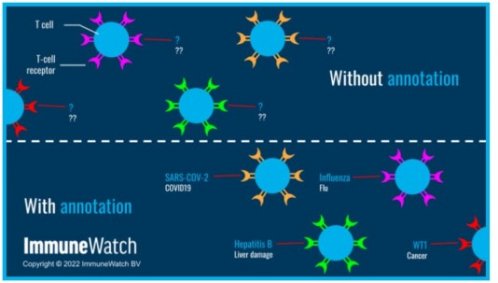Belgium (Universiteit Antwerpen) Spin-off ImmuneWatch

There’s a new start-up in the Flemish field of biotechnology. The University of Antwerp and Antwerp University Hospital announce their new spin-off: ImmuneWatch. The company builds digital technology based on artificial intelligence to monitor and predict immune responses. This technology should make the development of vaccines, diagnostics and immunotherapy more efficient.
The seed for the company was sown eight years ago when Prof. Benson Ogunjimi, immunologist at UAntwerp and paediatric rheumatologist at UZA, reached out to Prof. Kris Laukens, bioinformatician at UAntwerp.
‘I do research on infectious diseases and autoimmune diseases, two areas where T cells play an important role’, Prof. Ogunjimi says. ‘T cells are specialised immune cells that use a unique receptor molecule to detect and eliminate invaders such as viruses, bacteria and cancer cells. Using the latest DNA techniques, we can systematically map millions of T cells in an individual’s blood sample. Up until now, finding out which T cell recognises which invader was only possible through expensive experiments.’
Next level
‘Our many years of experience in processing large data sets for medical applications allowed us to take on this challenge, which led to a pleasant and successful collaboration’, Dr Pieter Meysman says. He coordinated the research within Prof. Laukens’s lab and now takes on the role of CTO for ImmuneWatch. ‘Our teams developed new technology based on artificial intelligence. That technology brought unravelling immune responses to the next level.’
The team soon realised that the new technology could have many applications, ranging from improving vaccines to developing a blood test that can screen for a large number of immunological disorders at the same time. With the establishment of ImmuneWatch, an important step was taken towards bringing the technology to the market.
Diagnostic blood test
But of course there is still much work to be done. ‘Our challenge now is to turn this academic knowledge into products that can help companies as quickly as possible’, Dr Sander Wuyts, CEO of the new company, says. ‘Just think of vaccine developers, who can use this to quickly evaluate whether their new vaccines elicit optimal immune responses. COVID-19 clearly demonstrated the importance of this.’
The start-up’s ambitions extend beyond the vaccine industry. ‘We’re also keeping our eyes open for applications in oncology, autoimmune diseases and diagnostics. In the longer term, we want to develop a diagnostic blood test that can screen for a wide range of immunological problems’, Sander concludes.
